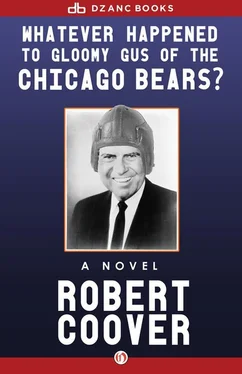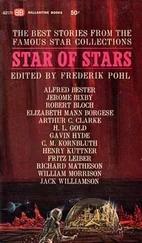Robert Coover - Whatever Happened to Gloomy Gus of the Chicago Bears?
Здесь есть возможность читать онлайн «Robert Coover - Whatever Happened to Gloomy Gus of the Chicago Bears?» весь текст электронной книги совершенно бесплатно (целиком полную версию без сокращений). В некоторых случаях можно слушать аудио, скачать через торрент в формате fb2 и присутствует краткое содержание. Год выпуска: 2014, Издательство: Dzanc Books, Жанр: Современная проза, на английском языке. Описание произведения, (предисловие) а так же отзывы посетителей доступны на портале библиотеки ЛибКат.
- Название:Whatever Happened to Gloomy Gus of the Chicago Bears?
- Автор:
- Издательство:Dzanc Books
- Жанр:
- Год:2014
- ISBN:нет данных
- Рейтинг книги:4 / 5. Голосов: 1
-
Избранное:Добавить в избранное
- Отзывы:
-
Ваша оценка:
- 80
- 1
- 2
- 3
- 4
- 5
Whatever Happened to Gloomy Gus of the Chicago Bears?: краткое содержание, описание и аннотация
Предлагаем к чтению аннотацию, описание, краткое содержание или предисловие (зависит от того, что написал сам автор книги «Whatever Happened to Gloomy Gus of the Chicago Bears?»). Если вы не нашли необходимую информацию о книге — напишите в комментариях, мы постараемся отыскать её.
Whatever Happened to Gloomy Gus of the Chicago Bears? — читать онлайн бесплатно полную книгу (весь текст) целиком
Ниже представлен текст книги, разбитый по страницам. Система сохранения места последней прочитанной страницы, позволяет с удобством читать онлайн бесплатно книгу «Whatever Happened to Gloomy Gus of the Chicago Bears?», без необходимости каждый раз заново искать на чём Вы остановились. Поставьте закладку, и сможете в любой момент перейти на страницу, на которой закончили чтение.
Интервал:
Закладка:
The last two games of the season were apparently real bloodlettings. The scrapbook showed he made the front page of nearly every newspaper in California. The coach probably should have taken Gus out after he got eight or nine touchdowns ahead, but he was too shaky to do anything by then but let things happen by themselves. They were such unsporting devastations that a number of teams canceled the next season’s games with Whittier. The coach was disconcerted by this boycott, but managed to turn it to his own advantage, filling the 1933 schedule with big-name teams. These teams had everything to lose and nothing to gain, so it wasn’t easy to draw them into a game, but he did get Notre Dame, which was also having trouble finding opponents in those days, and more important, though less of a team, Washington and Jefferson. Both wanted to use Whittier as a warm-up, early in the season, which spoiled the Chief’s sense of dramatic climax, but this, too, turned out well in the end. The stunning defeat of Notre Dame put Whittier in the national newspapers, and Gus’s massacre of Washington and Jefferson was so fearsome that the visitors not only refused to finish the game, leaving in utter self-disgust after the score reached 76-0, but they gave up football for the rest of the season, allowing Whittier to take over their program. By the time the Homecoming Game with Duke rolled around that year, Mrs. Herbert Hoover was in attendance, and the new Homecoming Queen was waiting tremulously outside the players’ lockerroom an hour before the opening ceremonies. Gloomy Gus broke almost every offensive record in the books that season, as did the Poets, though their record was more or less identical to his — the only important records left standing, in fact, were for punts and field goals, simply because the Poets never had to fall back on them.
Our paths might have crossed that fall and winter. Pursued by history, I was on the bum, drifting westward to California. Gus, making what I was running from, was being brought east to be wined and dined by the professionals. I was traveling on freights or hitchhiking (“goosing the ghost,” as Jesse calls it, a bit of slang left over from his days as a Bible salesman), he came first class by the Rocket . They took him to the National Football League championship between the Chicago Bears and the New York Giants, which the Bears won, 23–21, and to the Chicago Century of Progress Exposition. I sometimes felt that it was the insane preparations for that tinsely fair, in the middle of so much human misery, that had elbowed me out of Chicago, but I would have envied him his trip on the Skyride. He was already famous and became more a part of the fair than a visitor. He and Sally Rand and the Enchanted Island. While I, feeling exiled from myself and having had to sneak past border vigilantes and escape from detention camps, was out in southern California, partly because I’d hoped to reach Mexico, a private pilgrimage to the murals (didn’t make it), mainly just because it was warmer. You didn’t freeze sleeping in the street. I worked my way from town to town as an odd-jobs man, wearing cardboard in the soles of my shoes, and on my back whatever gratuities fell there. In the Los Angeles area, some stern old lady gave me a moth-eaten sweater with some kind of fraternity insignia on it, and for all I know she was Gus’s grandmother. In Chicago, Gus seduced an entire cross section of the city on a one-each-of-a-kind program, and as far as he knew one of them was my sister. If I’d had a sister. Each day he practiced religiously, protecting and honing his skills and adding new ones. I was adding new ones, too — plumbing, carpentry, gardening, bricklaying, automobile repair, electrical wiring, even begging and petty thievery — and though my hunger was more immediate and familiar, it could be said that hunger drove us both. Both of us were ranging far from home, fulfilling myths about ourselves, his the rags-to-riches drama of the industrious American boy, mine the curse of the Wandering Jew. And we were both — captives of alienating systems — divided within ourselves. “To subdivide a man,” Marx has said, “is to execute him if he deserves the sentence, to assassinate him if he does not.”
At home, I find that somebody’s painted a swastika on my door with black paint. Some childish prank probably, but that doesn’t stop my heart from leaping to my throat. I try to stare as coldly as I can at the thing, since maybe they’re watching me to see what I’ll do, but inside I feel like I’m coming apart at all the joints. I’m an atheist, my first struggle against ideology was against Judaism, Freud freed me from my family, what was left of it, and socialism from my parochialism, but it’s all been an illusion, I can see that now. Meyer, I say to myself, feeling again that jerk on the leash, be a Jew. Stop kidding yourself, and be a Jew.
I step firmly toward the door (have I been thinking about walking away, pretending I don’t live here?) and force the key in. Then suddenly I get panicky about the Baron. Of course, the Baron isn’t Jewish. But kids in the neighborhood have tried to get him before. I burst into my studio, arms full of fish and fruit, calling for him. He comes in from the back, stretching sleepily, rubs up against my leg to be stroked. “Hey, Baron,” I cry, setting the packages down. “That’s all right, boy, it ain’t the last consumption!” Something Jesse used to say after a bad day on the road. The Baron sniffs the groceries. I’m calming down at last. I give the Baron the fishheads and other scraps. I’d meant to parcel them out over two or three meals, but I’m so grateful he’s alive, I give it all up at once like some kind of propitiating sacrifice. Be a Jew.
“There was much that was interesting and much that was amusing in our house,” Gorky wrote, “but sometimes I was overwhelmed by a vast longing. It was as though a great burden were weighing me down, and I went on living at the bottom of an inky pit, bereft of sight and hearing and feeling — blind and only half alive.” For over a month, that’s how I’ve felt. “Confined in a cold oily bubble… stuck into it like a midge.” But no longer. Now, with that swastika on the door, the Baron rumbling softly over the stringy translucent bits, blind Gorky looking down on me, Gus dead and the streets drying up, my clothes wet on me and abrasive, dust motes floating in the soft ivory glow this side of the front window, I know that dead time is over. I’m frightened, but I’m alive again. And I know something else: I’m not going to Spain. Or to Palestine either. No more abdications. On some open shelving just past Gorky’s square chin lies some of my early work, bits and pieces of unfinished ideas, a few blasted victims from the Guernica blitz, odd scraps of collected junk, all heaped up on each other. There is no harmony in this random pile, but there is life. I don’t like Jane Addams’ carved wooden head lying there on that scarred steel clutch plate, but in its harsh dissonance the juxtaposition seems to say more about life than her head alone — romanticized, yes, I know that, but sometimes you can’t help it — ever did. Somebody has draped upon a Medusa-like crown of welded hair — but faceless — an old cap I used to wear on the road, and in the empty space where the face should be, like a kind of nose, leans the upraised leg of a baseball pitcher. I sit back against a bucket of scrap metal, thinking: In a class-ridden society, although itineraries may pass by and over each other, there is no real intersection — it’s like separate planes sliding by each other. Now I want to make them collide. It will be uncomfortable, but I want to do this. Why am I trying to express harmony and simplicity when that isn’t what I feel?
The swastika is still on the door and on my mind. The door I’ve left open, folded back against the inner wall, not wanting to put the sign out, so to speak, but I can’t leave it that way. I could scrape it off, but they’d probably just paint it on again. Paint over it, same thing. Besides, whatever the intentions of those who put it there, it has come to me as a kind of sign, and I feel like it’s important to leave it there. Transfigured maybe, but not dismissed. Never throw nothin’ away. I go get some black paint and turn the swastika into three little squares, leaving the fourth, the upper left one, open. The two squares adjacent to the open one I fill with sprays of colored flowers cut from a little book of them I have, and the other square I paint red. The irony of the flowers is submerged maybe in the implied cowardice in failing to declare myself (where are the Star of David, working-class symbols, or laments for bloodied Spain?), but in the land of the wolves things are bad enough without putting out bait. Especially when you’re the little pig who lives in the straw house. Or so I explain to the Baron, while varnishing the flowers.
Читать дальшеИнтервал:
Закладка:
Похожие книги на «Whatever Happened to Gloomy Gus of the Chicago Bears?»
Представляем Вашему вниманию похожие книги на «Whatever Happened to Gloomy Gus of the Chicago Bears?» списком для выбора. Мы отобрали схожую по названию и смыслу литературу в надежде предоставить читателям больше вариантов отыскать новые, интересные, ещё непрочитанные произведения.
Обсуждение, отзывы о книге «Whatever Happened to Gloomy Gus of the Chicago Bears?» и просто собственные мнения читателей. Оставьте ваши комментарии, напишите, что Вы думаете о произведении, его смысле или главных героях. Укажите что конкретно понравилось, а что нет, и почему Вы так считаете.












